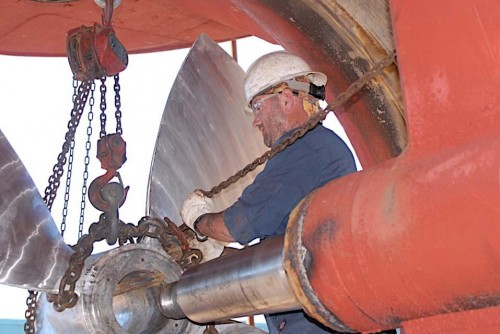
Leander J. Troxler
September 23, 2008Garnet G. White
September 25, 2008With unemployment rates in the Tri-parishes nearly half that of the national average, many businesses are having a hard time finding employees to fill positions.
One of the industries most affected by a lack of skilled labor is shipbuilding and repair.
“I’ve been in this business for 28 years, and I’ve never seen such a shortage in my career,” said Dennis Fanguy, vice president of quality management systems for Bollinger Shipyards in Lockport. “It’s really been difficult.”
To alleviate the problem, the Gulf State Shipbuilders Consortium (GSSC), a partnership of major shipbuilders in Louisiana, Mississippi and Alabama, launched a plan last month to get residents to embark on careers in this industry.
The Shipbuilding Career Initiative is designed to create a common set of standards for new employees. If someone has a certain level of training, any shipyard in the GSSC could accept him or her.
“We’re trying to develop a set of curriculums for ship fitters and welders, and get those to the trade schools so they can start training students as they either come out of high school or even when they’re in high school,” Fanguy said. “Once they graduate those programs, we can immediately take them into the shipyards.”
The GSSC is also developing a six-week ship fitter boot camp. Once the program is completed, participants could begin working as a third class ship fitter.
The GSSC was started in December 2006 to enhance the image of the industry and insure a steady supply of highly qualified workers.
Reaching potential employees through such traditional means as advertisements and high school and college job fairs have not been effective as it once was.
“I think kids coming out of high school today are more interested in working technical jobs with computers,” said Jody Badeaux, vice president and general manager of Quality Shipyards LLC in Houma. “They believe manual labor work does not pay well and isn’t a good career, which is absolutely incorrect.”
There’s a wide range of jobs available. Entry-level employees can earn about $10 to $12 an hour and work themselves up to $18 to $20 an hour as a first class mechanic or craftsman.
The positions most in need of filling are pipe welders, pipe fitters, structural welders, and electricians.
To fill their needed workforce, shipyards are bringing in foreign nationals on H2B visas. However, with only 66,000 10-month visas available yearly, companies have to plan production around the time foreign workers are here and when they’re not.
“The foreign nationals are considered a surge workforce,” said Badeaux who has been in shipbuilding for 30 years. “When you depend on a labor force like that, it really effects your production. That’s why we need local people to work because they’re here 12 months a year instead of 10 months or less.”
Some shipbuilders are offering incentives and bonuses to entice more local workers.
If current Bollinger employees bring in a new employee, the company rewards both with a $150 recruitment bonus. Quality doesn’t have an employee bonus, but it does have certain bonuses for different levels of employees throughout the year.
The national emphasis on sending as many kids to college as possible maybe a contributing factor to the shortage of skilled manual labor according to shipbuilding executives.
“There’s nothing wrong with going to college, but there are people who don’t go to college,” Badeaux said. “The real question is where are they going to work or are they?”
“Only 20 percent of high school graduates will end up graduating college, which is great because we have positions for the college graduates at the shipyards,” Fanguy said. “We’re looking at the other 80 percent. They’ve got to have a career, and the problem is we’re not setting them up on a good career path the way the high schools are structured.”
Politicians in Baton Rouge and Washington, D.C., have discussed some type of high school redesign where students would have to take mandatory vocational training or work experience to graduate.
Gov. Bobby Jindal has mentioned it in several education and workforce speeches. At separate appearances in Houma last month, Louisiana’s senators, Mary Landrieu and David Vitter said they could support the idea.
Shipbuilding and other blue-collar industries would benefit greatly if such a transition in primary education is made.
“If an 18-year guy or gal came out of high school and had the ability to start welding or knew how to use a torch to cut a piece of plate, we could bring them in at a better labor rate,” Badeaux said. “If they have better skills then we could start production because what we don’t need is helpers who need three, four, five years to get up to speed as a first class mechanic.
“We need people who have skills that can come in and within a few months can become good mechanics,” he added.
Shipbuilding and repair is not the cyclical business it was in the 1980s, executives insist. The industry’s tremendous growth since then cannot be maintained without a fresh infusion of skilled blue-collar labor.
Hurricanes Gustav and Ike have not slowed down shipyard production.
“All of our member shipyards had power and water infrastructure restored and their employees have returned,” said Lisa Tomlin, a GSSC director.
Bollinger could use another 150 employees throughout its 12 facilities constructing barges and supply boats and repairing vessels. Quality could add on 200 more employees by the end of the year to build boats for its parent company, Tidewater, and other contractors.
“I have more facility than people to do the work,” Badeaux said.
Anyone interested in applying for a job with a GSSC member can call 1-800-269-1268, or visit www.goships.com.
Along the Gulf Coast, shipbuilders like Bollinger Shipyards and Quality Shipyards need to fill 4,000 skilled positions immediately. Entry-level employees can begin at $10 to $12 an hour and work themselves up to $18 to $20 an hour. * Photo courtesy of BOLLINGER SHIPYARDS












